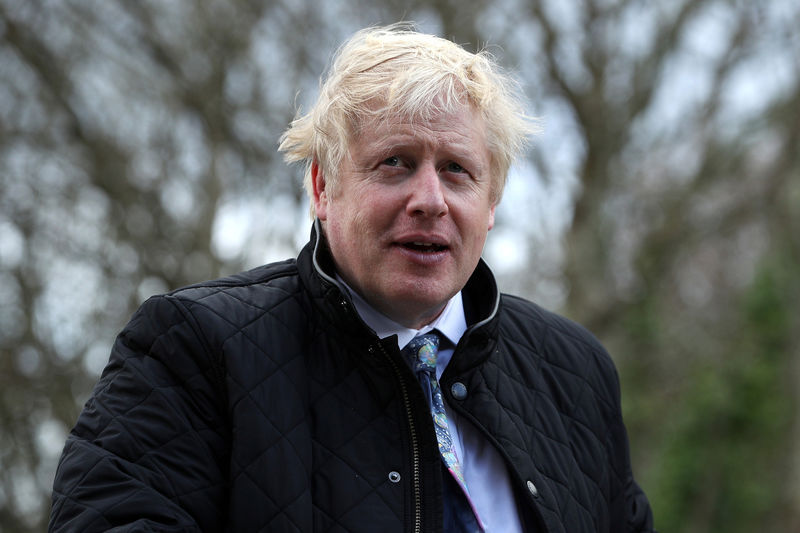By Andy Bruce and Guy Faulconbridge
LONDON (Reuters) - Britain's Conservative Party is on course to win its biggest majority in parliament since 1987 at a Dec. 12 election, according to a new poll, which would give Prime Minister Boris Johnson a mandate to take the country out of the European Union.
The model developed by pollsters YouGov that accurately predicted the 2017 election result, showed the Conservatives are set to win 359 seats out of 650, which would be their best result since Margaret Thatcher's victory in 1987.
Johnson has pledged to deliver Brexit by Jan. 31 if he wins after nearly four years of political crisis that has shocked allies of a country once considered one of the pillars of Western economic and political stability.
Since Britain voted to leave the EU in a June 2016 referendum, Johnson and his predecessor Theresa May have both tried and failed to get deals to leave the 28-member bloc through parliament because they lacked a majority.
"Our first MRP model projection for the 2019 election suggests that this time round the Conservatives are set for a majority," said Anthony Wells, director of political and social research at YouGov, referring to its Multilevel Regression and Post-stratification (MRP) model.
"The swing to the Conservative party is bigger in areas that voted to Leave in 2016, with the bulk of the projected Tory gains coming in the North and the urban West Midlands, as well as former mining seats in the East Midlands," said Wells.
The British pound, which rose when rumors of the poll results circulated, shot up when it was published, rising half a cent in minutes to hit a day's high of $1.2948.
The main opposition Labour Party is on track to secure 211 seats, down from 262, according to the YouGov model. The Scottish National Party (SNP) was on 43, the Liberal Democrats on 13 and the Brexit Party was not expected to win any seats.
HEADING FOR BREXIT
The YouGov model crunched data from more than 100,000 interviews over seven days along with demographics, specific constituency circumstances and national statistics to come up with a projection.
It shows the election is now Johnson's to lose.
According to the model, the Conservatives would gain 47 seats: 44 from Labour, two from the Lib Dems and the seat previously held by the Speaker of parliament. Labour are not on course to win any new seats.
"Most seats changing hands are ones that Labour won in 2017 that are now set to be taken by the Conservatives," YouGov said. "What happens in these constituencies is the most important dynamic in deciding whether Boris Johnson has a majority, and how large it ends up being."
The Brexit Party is hurting the Conservatives more than Labour, while independents are finding it difficult to pick up seats, according to the model. It showed neither Johnson nor Foreign Secretary Dominic Raab are in danger of losing their seats.
Dominic Cummings, who is Johnson's senior adviser, cautioned before the YouGov results were released that a hung parliament was still a real possibility.
"You will see many polls in the coming days. Some will say Boris will win," he said. "Trust me, as someone who has worked on lots of campaigns, things are much tighter than they seem and there is a very real possibility of a hung parliament."
The margins of error in the model put the Conservatives seat projection between 328 and 385, YouGov said, adding that there was still plenty of time for people to change their minds before Dec. 12 - the first Christmas election in nearly a century.
In late May 2017, just over a week before the June 8 election, YouGov's model projected Theresa May would lose her majority, even though she had been ahead in most polls.

The model, developed by Ben Lauderdale of the London School of Economics and Doug Rivers of Stanford University, was accurate: May did lose her majority, a failure that complicated Brexit and eventually destroyed her premiership.